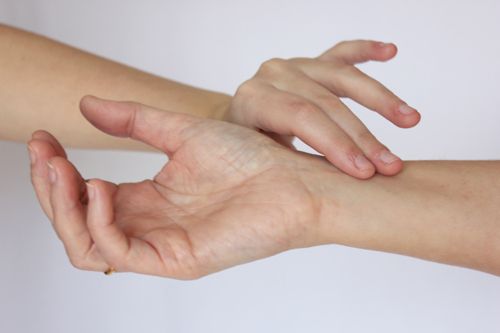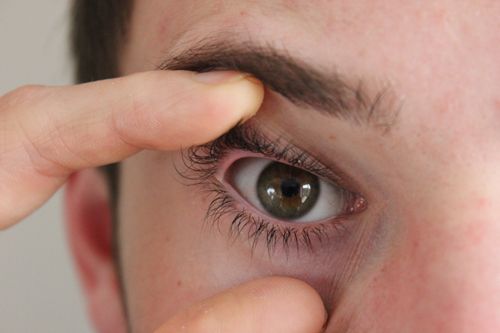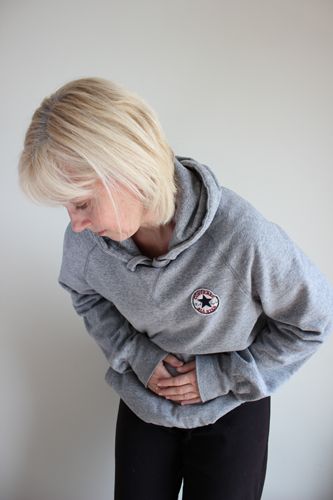
A trip to the doctors is a task many people will put off. Whether it’s a fear of potential embarrassment, reluctance to take time off work, or the worry that something could be seriously wrong, going to your GP is often bottom of your to-do list.
But everyone needs a health MOT every now and then, and as you get older, this becomes even more important.
There are several online health checks, which you can do in the comfort of your own home and will give you a good idea on how your body is doing. Your body will nearly always give clear warning signs if something is wrong, so it’s up to you to listen to them.
Although these tests should not replace a trip to the doctors, they allow you to test your health more regularly and spot potential problems more quickly.
Here’s our DIY Health Check Guide, which should help you keep a closer eye on your health.
Fitness
 Flexibility: The more flexible you are, the less prone you will be to back pain and injuries. You can test your flexibility with one simple stretch. Warm-up with a gentle jog for a few minutes, and then sit on the floor with your legs straight out in front of you and try to touch your toes.
Flexibility: The more flexible you are, the less prone you will be to back pain and injuries. You can test your flexibility with one simple stretch. Warm-up with a gentle jog for a few minutes, and then sit on the floor with your legs straight out in front of you and try to touch your toes.
What do to: If you struggle to do this, you could consider yoga or pilates class. Or, if this isn’t your thing, then trying a few simple stretches like this every day should increase your flexibility and help to avoid back injuries in the future.
Heart
Pulse: Your pulse is a good measure of your fitness – it should be around 70 beats a minute. A rapid pulse could mean that you have an overactive thyroid and an irregular pulse could be a sign of atrial fibrillation. If you are unsure how to measure your heart rate, have a look at the NHS guide.
 What do to: If your pulse is high, you could simply be unfit. Try to exercise at least three times a week, even if this is just a brisk walk to start with. A healthy lifestyle can also improve your heart rate, so try to eat a balanced diet, reduce your salt intake, give up smoking and drink less alcohol.
What do to: If your pulse is high, you could simply be unfit. Try to exercise at least three times a week, even if this is just a brisk walk to start with. A healthy lifestyle can also improve your heart rate, so try to eat a balanced diet, reduce your salt intake, give up smoking and drink less alcohol.
Heart Rate Recovery This is more useful than your pulse as a measure of how fit you are, as it sees how well your heart copes with the strain of exercise.
 Run for 10 minutes and measure your heart rate 15 seconds after, and then compare this to your heart rate a minute after the run. To determine your heart rate recovery number, subtract the latter from your exercise heart rate. Divide this number by ten, and you have your heart rate recovery number. If your heart rate recovery number is above 6 then you are very fit, between 4 and 6 is very good, 3 to 4 is fair and below 2 is poor.
Run for 10 minutes and measure your heart rate 15 seconds after, and then compare this to your heart rate a minute after the run. To determine your heart rate recovery number, subtract the latter from your exercise heart rate. Divide this number by ten, and you have your heart rate recovery number. If your heart rate recovery number is above 6 then you are very fit, between 4 and 6 is very good, 3 to 4 is fair and below 2 is poor.
What to do: If you want to improve your heart rate recovery time, try to exercise more. The NHS recommends that adults should do 150 minutes of physical activity a week. See NHS Fitness ideas to see if you’re doing enough physical activity.
Weight
 Calculate your BMI: Your BMI is a good indicator of your general health. You can use the NHS BMI calculator to find out whether you are a healthy weight for your age and height. It’s important to think about your weight – being overweight can put you at risk of many different conditions including heart disease and type-2 diabetes.
Calculate your BMI: Your BMI is a good indicator of your general health. You can use the NHS BMI calculator to find out whether you are a healthy weight for your age and height. It’s important to think about your weight – being overweight can put you at risk of many different conditions including heart disease and type-2 diabetes.
What do to: You should be aiming for a BMI between 18.5 and 24.9. If your BMI is higher than this, you should consider exercising more and improving your diet–reducing the amount of salt and saturated fats you eat. Alcohol is also very high in calories, so you should consider cutting down to the NHS recommended units per day. If your BMI is very high, it is a good idea to go to the doctors to see how this has already affected your health with a cholesterol test, blood pressure check and a test for type–2 diabetes.
Skin
 Healthy Skin: Your skin is good reflection on your overall health. If you notice pale, rough and flaky skin, this could indicate an underactive thyroid. While itchy, raised patches of skin on your lower legs and feet could mean you have an overactive thyroid.
Healthy Skin: Your skin is good reflection on your overall health. If you notice pale, rough and flaky skin, this could indicate an underactive thyroid. While itchy, raised patches of skin on your lower legs and feet could mean you have an overactive thyroid.
What do to: Be aware that dry or itchy skin can be more than just a simple rash. If you notice these symptoms, take a look at the other symptoms for thyroid problems listed on the NHS page. Consult your doctor if you are concerned.
 Check for skin cancer: It’s important to be aware of the symptoms of skin cancer as 95% of skin cancers can be treated successfully, if spotted early. You can easily check for this yourself – regularly check your arms, legs, face, back, neck, shoulders and backs of your hands for moles, spots and lumps that develop or change. Things to look out for are; a change in colour, shape, inflammation, bleeding, spots or moles that become crusty, itchy or painful.
Check for skin cancer: It’s important to be aware of the symptoms of skin cancer as 95% of skin cancers can be treated successfully, if spotted early. You can easily check for this yourself – regularly check your arms, legs, face, back, neck, shoulders and backs of your hands for moles, spots and lumps that develop or change. Things to look out for are; a change in colour, shape, inflammation, bleeding, spots or moles that become crusty, itchy or painful.
What do to: If you spot any of the symptoms above, talk to your doctor. To reduce your chances of developing skin cancer, avoid sunbathing and always wear high factor sun cream in sunny weather.
Once you’ve had a mole checked out by a doctor, you can document it to see if it changes over time. Take a photograph of your mole next to a ruler, and then take another photo 6 months later – this way you can clearly see if the mole has changed.
Eye Health
 Test your vision Your eyesight changes over time, so it’s important to test your eyes regularly. You can test your eyes online to see if our eyesight is getting worse. It’s also good to have regular check-ups at an optician, as this can lead to eye conditions being spotted early.
Test your vision Your eyesight changes over time, so it’s important to test your eyes regularly. You can test your eyes online to see if our eyesight is getting worse. It’s also good to have regular check-ups at an optician, as this can lead to eye conditions being spotted early.
What to do: You can look after your eyes by ensuring you are wearing the correct glasses through regular check-ups. As well as this, if you want to look after our eyes, it’s important to wear sunglasses on bright days to protect your eyes from UV rays.
 Eyes and high cholesterol: The appearance of your eyes can be an indicator as to whether you have high cholesterol. Look out for a thin white circling around the edge of the iris, and yellow flattish spots on the eyelid, or around the eye.
Eyes and high cholesterol: The appearance of your eyes can be an indicator as to whether you have high cholesterol. Look out for a thin white circling around the edge of the iris, and yellow flattish spots on the eyelid, or around the eye.
What to do: If you notice any of these symptoms, consult a doctor for a cholesterol test. To ensure your cholesterol levels stay healthy, eat a balanced diet and ensure you do the recommended amount of exercise per week.
Hearing
 Hearing loss: Many who struggle with hearing are in denial about their hearing loss. Take a moment to reflect on your own hearing – do you often ask friends and relatives to turn up the TV? Do you find it hard to hear what people are saying in large groups?
Hearing loss: Many who struggle with hearing are in denial about their hearing loss. Take a moment to reflect on your own hearing – do you often ask friends and relatives to turn up the TV? Do you find it hard to hear what people are saying in large groups?
What to do: If you think you have a hearing problem, consult a doctor. If not, you can reduce your chances of experiencing hearing problems by listening to music on 60% of your MP3 player’s volume (as recommended by the NHS). You can see the NHS’s full guide to protecting your hearing here, and Hearing Health also provides advice and tips.
Oral Health
 Gum Disease: This can be very dangerous for your health and can seriously damage your teeth. The symptoms are easy to spot – if you notice that your gums are red and swollen and bleed easily, then you could have gum disease. It’s important to seek professional help as soon as possible, if you spot any of these symptoms. Gum disease can be detrimental to your health, as bacteria from infected gums can get into the bloodstream and travel to other organs. It can also be very damaging to your teeth – the disease can cause mouth abscesses, which can destroy the fibres that secure your teeth to your gums.
Gum Disease: This can be very dangerous for your health and can seriously damage your teeth. The symptoms are easy to spot – if you notice that your gums are red and swollen and bleed easily, then you could have gum disease. It’s important to seek professional help as soon as possible, if you spot any of these symptoms. Gum disease can be detrimental to your health, as bacteria from infected gums can get into the bloodstream and travel to other organs. It can also be very damaging to your teeth – the disease can cause mouth abscesses, which can destroy the fibres that secure your teeth to your gums.
The symptoms of gum disease could also indicate diabetes, anaemia and vitamin C deficiency, so it’s important to get this checked out.
 What to do If you experience these symptoms, consult your dentist immediately. You can reduce your chances of developing gum disease through good dental hygiene (e.g. brushing your teeth twice a day and flossing)
What to do If you experience these symptoms, consult your dentist immediately. You can reduce your chances of developing gum disease through good dental hygiene (e.g. brushing your teeth twice a day and flossing)
Mouth Cancer: You can check your mouth in the mirror for many of the signs of mouth cancer. Look out for white or red patches on the tongue or mouth. You should also be aware that if mouth ulcers don’t heal after three weeks, this could indicate the disease as well.
What to do It’s important to make sure you have regular dental check-ups, as this will help to spot mouth cancer. To reduce your chances of devolving this disease, cut down on drinking and stop smoking, as these are the two biggest causes of mouth cancer. Improving your dental hygiene will also reduce your chances of developing this.
Respiratory System
 Lung Cancer: This is one of the most common and serious types of cancer. There are a few warning signs that you can look out for, as well as lifestyle changes which reduce your risk of developing the disease. If you have persistent cough, pain while breathing, cough up blood, or experience breathlessness, this could indicate the early stages of lung cancer.
Lung Cancer: This is one of the most common and serious types of cancer. There are a few warning signs that you can look out for, as well as lifestyle changes which reduce your risk of developing the disease. If you have persistent cough, pain while breathing, cough up blood, or experience breathlessness, this could indicate the early stages of lung cancer.
What to do: You should consult your doctor ASAP if you experience these symptoms. Smoking is responsible for 90% of all cases of lung cancer, so you can greatly reduce your risk by either cutting down on the amount you smoke, or best of all, quitting altogether.
Digestive System
 Stomach Cancer: It’s easy to mistake the symptoms of stomach cancer for less serious conditions. Consider how you feel after meals–do you experience persistent indigestion, heart burn, stomach pain, bloating or wind?
Stomach Cancer: It’s easy to mistake the symptoms of stomach cancer for less serious conditions. Consider how you feel after meals–do you experience persistent indigestion, heart burn, stomach pain, bloating or wind?
What to do: If these symptoms persist, you should consult your doctor. You can reduce your risk of developing the disease with a few changes to your diet–avoid pickle, salted fish and smoked meat. Also, if you smoke, you’re twice as likely to get stomach cancer, so those who stop smoking can also reduce their risk.
Bowel Cancer: While you may not pay too much attention to the contents of your toilet, it’s worth checking from time to time that your stools are healthy. You should look for blood in your faeces, or any changes in bowel habits such as diarrhoea, constipation. Also, abdominal pain is a symptom of bowel cancer, so be aware of this.
What to do: If you experience any of these symptoms, consult your doctor. You can reduce your chances of bowel cancer if you cut down on red or processed meat, as well as alcohol and smoking.
Urinary Tract
 Urinary Incontinence: Many ignore bladder problems, as they either think it’s nothing to worry about, or are too embarrassed to go to the doctors. If you often feel an urgent need to urinate, or suffer from loss of bladder control, then you may have a form of urinary incontinence. See the Overview of urinary incontinence by the NHS to see whether your bladder is healthy.
Urinary Incontinence: Many ignore bladder problems, as they either think it’s nothing to worry about, or are too embarrassed to go to the doctors. If you often feel an urgent need to urinate, or suffer from loss of bladder control, then you may have a form of urinary incontinence. See the Overview of urinary incontinence by the NHS to see whether your bladder is healthy.
What to do: If you think you may have a problem, consult your doctor. Bladder problems like this can affect a wide variety of people – of all ages. You can’t really avoid it, but if you are obese, you will be more at risk.
Bladder Cancer: If you often experience the sudden urge to urinate, it could indicate a wide variety of minor bladder problems, or it could be something more serious like bladder cancer. Be aware of your normal toilet habits, so that you notice if there is a change.
What to do: If you think you may need to urinate more frequently than normal; you should consult your doctor. Smoking is the biggest risk factor for this disease, so if you cut down on your smoking, you can reduce your risk of developing this disease.
Mental Health
 Stress, Depression & Anxiety: Mental health is just as important as your physical health – although many ignore the signs of mental health problems. According to the Mental Health Foundation, one in four people will experience some kind of mental health problem during the course of a year. If you think you are struggling to cope with stress, depression or anxiety, you certainly are not alone. Although every life has its ups and downs, if negative emotions are taking over your life, then you may need medical help. For further information see the NHS Moodzone.
Stress, Depression & Anxiety: Mental health is just as important as your physical health – although many ignore the signs of mental health problems. According to the Mental Health Foundation, one in four people will experience some kind of mental health problem during the course of a year. If you think you are struggling to cope with stress, depression or anxiety, you certainly are not alone. Although every life has its ups and downs, if negative emotions are taking over your life, then you may need medical help. For further information see the NHS Moodzone.
What to do: If you feel you are struggling, then you should consult your doctor, where you may be referred to a therapist or given antidepressants. Or you can also try self- help techniques, like regular exercise and mediation. This can help to boost your mood and allow you to unwind after a stressful day.
Female Health

Breast Cancer:
Breast cancer is one of the most common cancers in the UK, so it’s important to know the signs. All women are advised to check their breasts regularly to look for changes in shape and size, as well as looking for redness, dimpling or lumps forming on the skin.
What to do: If you spot something unusual, you should contact your doctor immediately. The causes of breast cancer are not understood, but the disease is most common in women over 50.
Ovarian Cancer:
Ovarian cancer is most common in women over 50. Becoming aware of the warning signs yourself, can help with an early diagnosis. If you experience bloating, abdominal pain and have difficulty eating, then you should consult your doctor.
What to do: If you are concerned about any symptoms you have experienced, consult your doctor ASAP.
Male Health

Testicular Cancer:
The NHS recommends that all men should regularly (around once a month) check their testicles for lumps. It’s also important to look out for the other signs of testicular cancer such as a dull ache in the scrotum, or a feeling of heaviness in the scrotum.
What to do: If you notice any of these symptoms, consult your doctor as soon as possible. You can reduce your chances of developing the disease if you quit smoking, as long-term smokers are twice as likely to develop the disease as non-smokers.
Prostate Cancer:
Prostate cancer is the most common cancer in men. Prostate cancer develops slowly, but you should be aware of the first signs such as a need to urinate more frequently, or difficulty urinating, as this could indicate the beginnings of the disease.
What to do: If you notice these symptoms, consult your doctor as soon as possible. The exact causes of prostate cancer are unknown, but obesity and an unhealthy diet can increase your risk.
See Prostate Cancer UK’s online risk checker.
You can reduce your chances of developing many of these diseases by adopting a healthier lifestyle. However, others simply require you to be mindful of how your body changes over time.
Giving yourself a health MOT every now and then can help to spot problems early and puts you back in control of your health. It’s important not to underestimate the importance of regular check-ups with your doctor, a good combination of self-help and professional assistance is the right balance for a ‘healthy’ relationship with your health.
Images by Hannah Roberts
